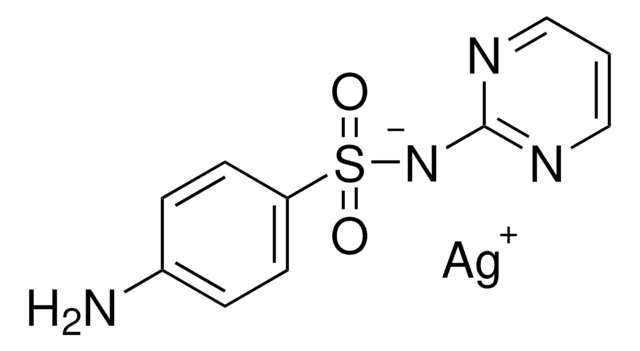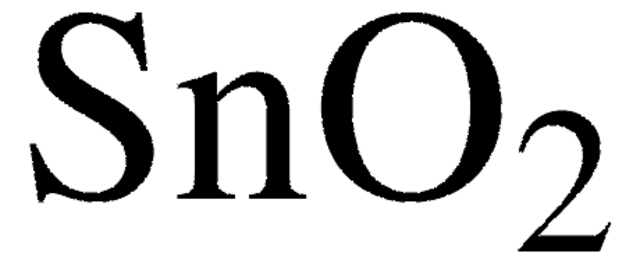199478
Germanium(IV) oxide
(crystalline powder), 99.998% trace metals basis
Synonym(s):
Germanium dioxide
Sign Into View Organizational & Contract Pricing
All Photos(3)
About This Item
Linear Formula:
GeO2
CAS Number:
Molecular Weight:
104.64
EC Number:
MDL number:
UNSPSC Code:
12352303
PubChem Substance ID:
NACRES:
NA.23
Recommended Products
Quality Level
Assay
99.998% trace metals basis
form
(crystalline powder)
mp
>400 °C (lit.)
density
4.23 g/cm3
application(s)
battery manufacturing
SMILES string
O=[Ge]=O
InChI
1S/GeO2/c2-1-3
InChI key
YBMRDBCBODYGJE-UHFFFAOYSA-N
Looking for similar products? Visit Product Comparison Guide
Related Categories
General description
Germanium(IV) oxide (GeO₂) is a semiconductor material known for its notable optical properties and high refractive index. It finds extensive use in various applications within electronics and optics. This compound is slightly soluble in water and acts as a catalyst in industrial processes. Additionally, GeO₂ is employed in the development of sensors for gas detection and other chemical species, utilizing its semiconductor characteristics to enhance sensitivity and response times.
Application
Germanium(IV) oxide can be used:
- To prepare glasses for nuclear radiation shielding and ultra-broadband amplification. For example, germanium and bismuth oxide glasses.
- As a precursor to synthesize GeO2/TiO2 nanocomposites that can be used for the photocatalysis of organic pollutants.
- As an anode material for lithium-ion batteries due to its high lithium storage capacity, thermostability, and large volume expansion during the charge–discharge process.
Signal Word
Warning
Hazard Statements
Hazard Classifications
Acute Tox. 4 Oral
Storage Class Code
11 - Combustible Solids
WGK
WGK 3
Flash Point(F)
Not applicable
Flash Point(C)
Not applicable
Personal Protective Equipment
dust mask type N95 (US), Eyeshields, Gloves
Choose from one of the most recent versions:
Already Own This Product?
Find documentation for the products that you have recently purchased in the Document Library.
Customers Also Viewed
Zita Oláh et al.
Applied radiation and isotopes : including data, instrumentation and methods for use in agriculture, industry and medicine, 149, 75-82 (2019-04-29)
The radiochemical separation of n.c.a. arsenic on its own or for radio-labelling purposes usually involves the issue of reducing arsenic(V). Numerous approaches for reducing pentavalent arsenic have been examined. A novel HPLC method has also been presented for accessing the
P. M. Lambert
Inorganic chemistry, 37(6), 1352-1357 (2001-10-24)
The gel chemistry of germanium is explored through the formation and composition of a hydrous metal oxide precursor gel used in the preparation of the HfGeO(4) and HfGeO(4):Ti X-ray phosphors. The enhanced solubility of hexagonal GeO(2) in dilute ammoniacal solutions
Xinguo Hong et al.
The Review of scientific instruments, 80(7), 073908-073908 (2009-08-07)
We describe an approach for acquiring high quality x-ray absorption fine structure (XAFS) spectroscopy spectra with wide energy range at high pressure using diamond anvil cell (DAC). Overcoming the serious interference of diamond Bragg peaks is essential for combining XAFS
Sarah L Sewell et al.
Dalton transactions (Cambridge, England : 2003), (29)(29), 3857-3865 (2008-07-17)
Biomimetic synthesis is emerging as an advantageous alternative to the harsh synthetic conditions traditionally used in metal oxide syntheses techniques. Silaffins, proteins from the C. fusiformis diatom, form silica in an aqueous environment under benign conditions. Amine terminated PAMAM and
E A Anashkina et al.
Optics express, 20(24), 27102-27107 (2012-11-29)
We report generation of femtosecond optical pulses tunable in the 1.6-2.5 μm range using GeO2-doped core silica-cladding fibers. Optical solitons with a duration of 80-160 fs have been measured by the FROG technique in the 2-2.3 μm range. To the
Our team of scientists has experience in all areas of research including Life Science, Material Science, Chemical Synthesis, Chromatography, Analytical and many others.
Contact Technical Service










